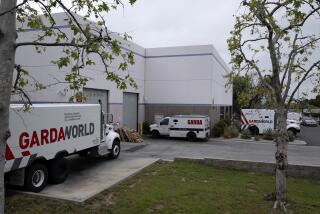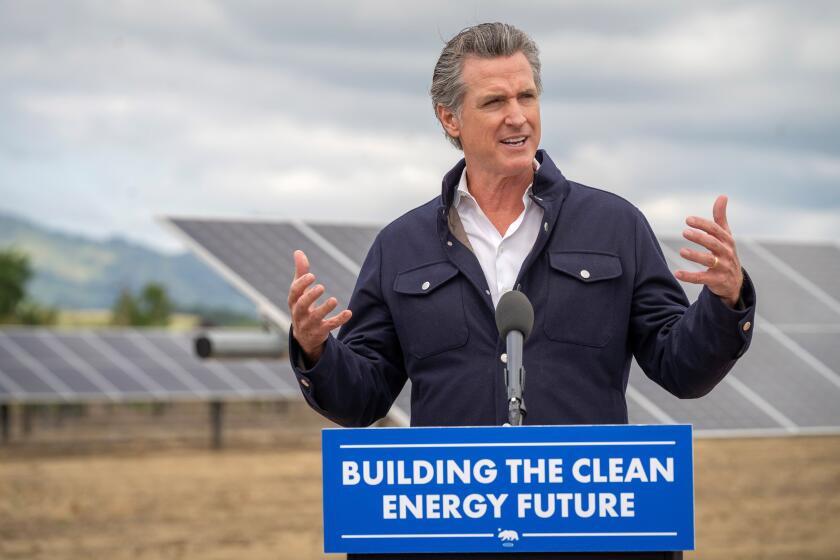New Toxic Chemical Warnings Appear to Mixed Reviews
Bruce Hochman was standing outside a 7-Eleven store in West Los Angeles on Saturday morning oblivious to a new sign in the window warning him that products sold there might contain chemicals that cause cancer and birth defects.
The small, red-white-and-blue sign advised Hochman and other shoppers to dial a toll-free number if they want to know what consumer products contain dangerous chemicals.
“I didn’t even notice it, to be honest,” the Santa Monica resident said. But after reading it, he concluded: “The sign is not helping you because it’s telling you to call this number. I think the product itself should have the information.”
The sign was one of thousands of such notices posted in stores and gas stations throughout the state Saturday in an attempt to comply with Proposition 65, the anti-toxics initiative approved by voters in 1986.
Walk Past Signs
Like Hochman, many consumers at Southern California stores and gas stations walked right past the signs without even noticing them. Often, the warnings were placed in out-of-the-way corners or among numerous other notices, making them easy to miss.
In Orange County, Proposition 65 warning signs were noticeably absent from several supermarkets and gas stations, and in those businesses where signs were posted, few people even bothered to read them.
In a Mobil gas station in Costa Mesa, franchise owner Eduardo Cisneros posted in his office window a 10-by-10-inch decal sent to him by the oil company, warning that gasoline products contain toxics known to produce cancer and birth defects.
“No one’s asked about (the warning), absolutely nobody,” he said, noting that the sign has been up since Monday. “I haven’t even seen anybody read it.”
Sure enough, none of his three employees had read the sign, and two of them hadn’t even noticed it.
Cisneros, who did read the sign, was particularly concerned about his newly acquired knowledge of the potential health hazards involved in the business of pumping gasoline. “I’ve worked in this gas station for 14 years now,” he said, “and I’ve never even had a cold.”
Motorists refueling at Cisneros’ station appeared to be unimpressed with the warning. In a period of 20 minutes, dozens of customers walked by the sign without noticing it, and even when it was pointed out, none bothered to read it.
“It’s not that I don’t care,” said motorist Randy Hoover, 37, an Irvine-based design engineer. “I just don’t have the time to read it. Of course I care about toxic waste, but there’s not much I can do about it.
“We tried to change things in the ‘60s, but nothing happened,” he added, as he started the powerful turbo engine of his blue sports car.
In a nearby convenience store, customers walked in and out without noticing a 10-inch sign advising them to call the hot line for information on the toxic levels of different products. An uneasy store attendant would not answer questions, but customer Jerry Johnson, 35, agreed to read the sign as he walked out of the store with a cup of coffee. “It doesn’t bother me,” he said after taking a quick look. “It doesn’t do anything for me.”
And throughout Southern California, reaction to the warnings was varied. Some shoppers said they welcomed information that would help them avoid chemicals that can cause cancer or birth defects. But others said it is a waste of time to post warnings for products like gasoline that people have been using for decades.
“It’s actually kind of silly to have signs all over the place,” said Michael DeLuca as he bought gas at a Unocal 76 station in West Los Angeles where notices warned motorists that “detectable amounts” of dangerous chemicals might be present. “What are you going to do? Wear a mask?”
Gasoline and its vapors can contain at least two of the 29 chemicals covered by the law’s warning requirements that took effect Saturday: benzene, a carcinogen, and lead, which can cause birth defects.
Under Proposition 65, businesses are prohibited from exposing people to toxic chemicals unless they first provide a “clear and reasonable” warning of the danger. Warnings are not required if the chemical does not pose a significant risk by exceeding the safety levels set by the state.
Companies that violate the law can face fines of up to $2,500 a day for each exposure. Any citizen who wishes to take advantage of the initiative’s bounty hunter provision can file suit and collect 25% of the penalty.
To comply with the law, dozens of companies throughout the state took out ads in Saturday’s papers to warn people about the hazards of pollutants coming from their plants and factories.
Northrop Corp., TRW, Rockwell International, McDonnell Douglas, Southern California Gas Co., FMC Corp. and GTE placed ads in The Times to warn their neighbors about the potential dangers of their operations.
The signs posted at stores and advertising the toll-free number are part of a warning program devised by the major food manufacturing companies to avoid the stiff penalties of the law without actually providing information about the hazards of each product to all consumers.
In order to learn whether products contain dangerous chemicals, consumers must call the hot line--(800) 431-6565--and identify each item by its brand name.
Contributing to this story were staff writers Andrea Estepa in San Diego, Santiago O’Donnell in Orange County and Greg Braxton in the San Fernando Valley.
More to Read
Start your day right
Sign up for Essential California for news, features and recommendations from the L.A. Times and beyond in your inbox six days a week.
You may occasionally receive promotional content from the Los Angeles Times.






